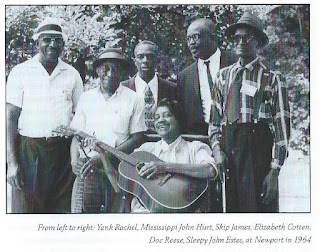I’m not really interested in hearing new music by the likes of Ed Sheeran or Adele. What I like to do is discover great music from the past that I have missed out on. Today my kitchen has been filled with the sound of the guitar and singing of Elizabeth Cotten. I just thought I would tell you a little bit about her, because I think her story is quite fascinating. It was through listening to Rhiannon Giddens that I first heard of Elizabeth Cotten. On youtube I came across a live video of Rhiannon singing a song called Shake Sugaree which I enjoyed, and she spoke a little about the person who wrote it, who also came from her state of North Carolina. This aroused my curiosity, and I wanted to hear the original version. Thus began a train of events which led to an album called Shake Sugaree arriving at my house three days ago.
Elizabeth Cotten was born in 1895 in a town called Chapel Hill, North Carolina. She was the youngest of five children. She gave herself the name Elizabeth on her first day at school because at home she was just called Li’l Sis. She left school aged 9 to become a domestic servant earning a dollar a month from which she saved enough to buy her first guitar for $3.75. It was a right-handed guitar, so, being left-handed she turned it upside down to play, and she developed a self-taught unique guitar style which in later years became known among guitar players as Cotten-Picking. By her early teens Elizabeth was writing her own songs, one of which was Freight-Train which several decades later would make her famous. She married at 17 and had a daughter Lillie. The family moved around the east of the USA for several years and finally settled in Washington D.C. When Lillie got married, Elizabeth divorced her husband and moved in with her daughter’s family. She stopped playing the guitar for over 25 years.
 |
| With Mike Seeger. |
She had a temporary job working in a department store when a chance fateful encounter changed her life. A child had got lost in the store and it was Elizabeth who found her and reunited her with her mother. That child was Peggy Seeger who was to become years later a famous folk singer and wife of Ewan McColl. Her mother was Ruth Crawford Seeger a well-known composer. Ruth gave Elizabeth her phone number and said to get in touch if she ever needed a job. That is how Elizabeth became a maid for the famous musical Seeger family. The most famous member of the family was Pete Seeger. There were musical instruments all over the house and the family soon became aware of Elizabeth’s talent when she began singing and playing again. Peggy Seeger learned Freight Train from Elizabeth off by heart.
 |
| At Newport 1964. |
When Peggy moved to England in the 1950s, she included Freight Train in her repertoire around the burgeoning Folk Clubs of the time. Two unscrupulous Englishmen whose names I won’t mention heard the song and copyrighted it as their own work. It was recorded by Chas McDevitt & Nancy Whiskey and became a huge hit in Britain. It heralded the short-lived Skiffle craze in Britain. A band in Liverpool called The Quarrymen included it in their act in the late 50s. (There is no known recording of their version, which is a shame because they became The Beatles!) This shows the influence of Elizabeth Cotten. When the Seeger family heard about the copyright issue of Freight Train, they sorted it out in Elizabeth’s favour, but she must have lost a lot of money in royalties.
The recordings that arrived through my letterbox this week were made by Peggy’s brother Mike Seeger in 1965/66. I must say it is a wonderful CD. The singer on the title song Shake Sugaree is actually Elizabeth’s great-grand-daughter Brenda Evans with Elizabeth accompanying her on guitar. It is a very simple song, almost like a nursery rhyme, but very catchy. You almost can’t resist singing along. Over half of the tracks are instrumentals played on guitar or banjo. This is where you can appreciate what a virtuoso guitar player Elizabeth was. I can’t play the guitar and know nothing about the technical aspects of it, but my ears tell me when I am in the presence of a great guitar player. I am sure the likes of Richard Thompson or Bert Jansch would listen to Elizabeth’s fingerpicking style with admiration. She does sing on many of the songs, but I think you would agree that her genius was in the guitar playing.
The album was originally released in 1967, but the re-release that I have contains ten previously unreleased tracks. There is also a very attractive booklet of sleeve notes from which I gleaned most of my information and photos. Elizabeth didn’t start performing professionally until 1960 when she had reached an age when most people retire. She received a Grammy award for her album Elizabeth Cotten Live at the age of 90. She continued playing live concerts until a few weeks before she died aged 92 in 1987. She was an American national treasure. I’m very pleased I discovered the music and learned about the amazing life of Elizabeth Cotten. I have shared a video below of Elizabeth singing her most famous song Freight Train.

















